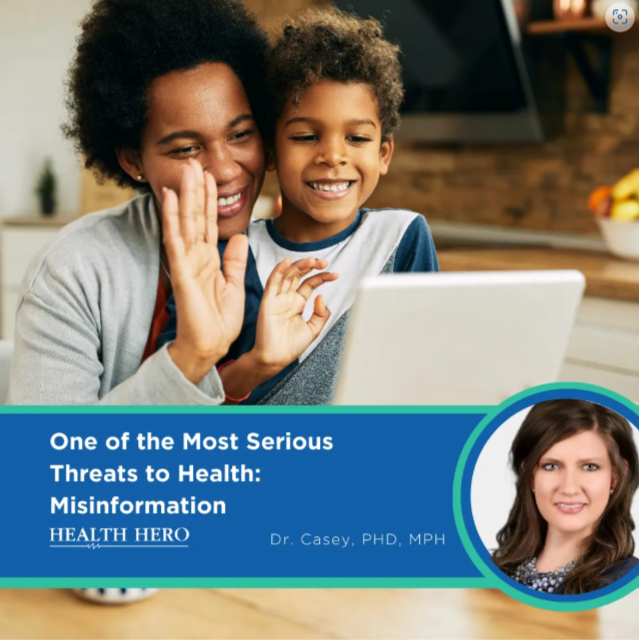We face health risks every single day in countless areas of life. From germs to improperly prepared food to pollution and countless other exposures, we face countless possible hazards every day. However, one of the most dangerous but underestimated threats to our health and well-being is actually misinformation about health. The U.S. Department of Health and Human Services defines misinformation as “false, inaccurate, or misleading information according to the best available evidence at the time.” And health misinformation, specifically, has been identified by countless professionals and health organizations as one of the leading threats to individuals’ health and safety. Dr. Vivek H. Murthy, U.S. Surgeon General, has said, “Health misinformation is a serious threat to public health. It can cause confusion, sow mistrust, harm people’s health, and undermine public health efforts.” Unfortunately, health misinformation, and particularly misinformation regarding vaccinations, has become an issue of epidemic proportions. Today, I will talk more about the issues surrounding health misinformation, including some of the causes, effects, and ways to stop it.
Why is health misinformation harmful?
People might make decisions about their health based on this untrue or incorrect information. Basing decisions on false information could be dangerous for one’s health. This includes misinformation about diseases, treatments, vaccines, procedures, and healthy lifestyle choices, and more.
How can you know if health information is accurate?
Check with credible sources. Check public health department websites and the Centers for Disease Control and Prevention at https://www.cdc.gov/ to fact-check information. Talk to a doctor, nurse, or other healthcare professional/expert to request any additional information they might have. You can also search online to see if a credible source, such as a governmental agency or peer-reviewed medical journals have verified claims.
**Do not seek factual information from social media. Unfortunately, social media is one of the most common ways to spread misinformation.
**If you aren’t sure if the information is credible, don’t share it.
Another great resource is the “Health Misinformation Checklist” from the Office of the U.S. Surgeon General which you can find here: https://www.hhs.gov/sites/default/files/health-misinformation-checklist-english.pdf
It is also important to be mindful of our inherent and (often unintentional) biases. Sometimes we may think we are doing our due diligence by looking for facts about an issue, but people naturally tend to hunt and/or be drawn to facts and opinions that support their beliefs and values. It can be difficult for anyone to be objective because we all have at least some kind of inherent opinion, however small or subconscious. So, beware of unintentionally seeking information that reinforces your innate ideas.
Despite several studies finding no association between vaccines and autism, the myth of a link continues to be spread by anti-vaccine activists.
Limiting the spread of health misinformation is a moral and civic imperative that will require a whole-of-society effort,” he said.
Experts say misinformation contributes to vaccine hesitancy
Health misinformation leaves a legacy
One of the most significant areas of medicine that has been affected by health misinformation is vaccines. In January 2019, the World Health Organization (WHO) named vaccine hesitancy as one of the top 10 threats to global health, and this was long before the COVID-19 pandemic and vaccinations sparked widespread controversy. At the time, the WHO estimated that 1.5 million lives could be saved worldwide if vaccines were more widely accepted. In 2021, some of the top health officials in the U.S. admitted that they had underestimated the vaccine hesitancy issue, thinking people would become increasingly willing to be vaccinated as the benefits of the vaccine became clear. This was not the case, though, and vaccine hesitancy spread beyond the COVID-19 vaccine and on to vaccines that had long been established and accepted as safe and important, particularly for children. Experts have said that the vast amount of health misinformation has significantly contributed to vaccine hesitancy and refusal.
Unfortunately, once these ideas are let loose, regardless of how true (or not) they are, very little can be done to undo the damage of the original claims. For example, despite numerous studies showing no association between vaccines and autism (and the original study making that claim was found to be incredibly fraudulent, the publication withdrawn, and the physician-scientist having lost his license to practice medicine), the myth of a link between vaccines and autism persists and is spread by anti-vaccination activists. Despite being fraudulent, fabricated, disproven, and criminally pursued, the damage done by that first study cannot be undone. From situations like this, countless health professionals and the U.S. Surgeon General insist that “Limiting the spread of health misinformation is a moral and civic imperative that will require a whole-of-society effort.” It is up to all of us to combat these falsehoods to protect the greater good of the people.
Other Questions?
I am frequently asked about misinformation, particularly regarding vaccines, so I thought many readers might have questions about it, too. I wanted to emphasize this topic because we are in the time of year when germs are rampant and the need to protect ourselves is greatest. Also, I have seen an uptick in vaccine misinformation in recent weeks, and I want to emphasize how important it is for people to look at the facts and to fact-check the “facts.” My second cousin’s best friend who is completely unrelated to the medical field is not my go-to for health advice or the latest data. Remember who you are trusting with your health and safety, and that of your family and community. We have an obligation to be mindful for each other. Please continue sending in questions and comments; I love to hear your feedback and answer anything I can! Stay healthy as we enter this chilly season!
Be Well; Be Kind,
Dr. Casey
Want to Learn More?
For a quick overview of the U.S. Surgeon General’s Advisory on Confronting Health Misinformation, this one page summary is fantastic: https://www.hhs.gov/sites/default/files/health-misinfo-printable-summary.pdf
If you want to take a deeper dive into this topic, you can also read the full advisory from the U.S. Surgeon General on Confronting Health Misinformation, found here: https://www.hhs.gov/sites/default/files/surgeon-general-misinformation-advisory.pdf
The Office of the U.S. Surgeon General has also developed “A Community Toolkit for Addressing Health Misinformation” that provides great resources on understanding health misinformation, how to recognize it, how to talk about it with others, and other resources. You can access this toolkit here: https://www.hhs.gov/sites/default/files/health-misinformation-toolkit-english.pdf
If this subject really interests you, I suggest this documentary from PBS called Vaccination from the Misinformation Virus. It discusses overcoming personal bias to understand the role vaccines play in community health and saving lives. You can stream it here: https://www.pbs.org/show/vaccination-misinformation-virus/

